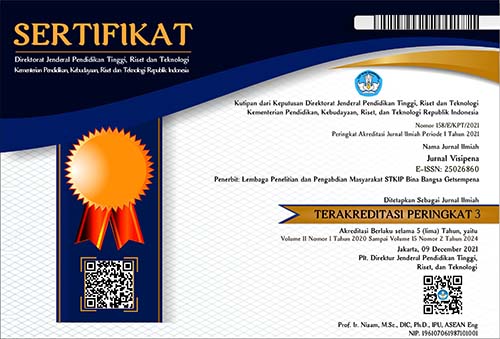PENINGKATAN SELF EFFICACY BELAJAR MAHASISWA MENGGUNAKAN MODEL PEMBELAJARAN BERBASIS MASALAH
Abstract
This study aims to improve students' self efficacy in mathematics education elementary school 2 using problem-based learning on PGSD students in 7D grade odd semester of academic year 2017/2018. This research is a collaborative classroom action research. The results showed that the problem-based learning model can improve students' self efficacy learning. Increased self-efficacy is indicated by self-study questionnaire score students learn from before given action. On the aspect of level 40,10% low category and increase until end of cycle equal to 89,25% with high category. Strenght aspect of 7.45% on pre-action and increased up to the end of cycle 86.45 and Aspects of Generality ie from 47.20% with low qualifications increased to 85.03% at the end of the cycle.
Abstrak
Penelitian ini bertujuan untuk meningkatkan self efficacy belajar mahasiswa pada matakuliah pendidikan matematika SD 2 menggunakan pembelajaran berbasis masalah pada mahasiswa PGSD kelas 7D semester ganjil tahun akademik 2017/2018.Penelitian ini adalah penelitian tindakan kelas (classroom action research) secara kolaboratif. Hasil penelitian menunjukkan bahwa model pembelajaran berbasis masalah dapat meningkatkan self efficacy belajar mahasiswa. Peningkatan self efficacy ditunjukan dengan Skor angket self efficacy belajar mahasiswa dari sebelum diberikan tindakan. Pada aspek level 40,10% kategori rendah dan meningkat sampai akhir siklus sebesar 89,25% dengan kategori tinggi. Aspek Strenght sebesar 7,45% pada sebelum tindakan dan meningkat sampai dengan akhir siklus 86,45 serta Aspek Generality yaitu dari 47,20% dengan kualifikasi rendah meningkat menjadi 85,03% pada akhir siklus.
Kata Kunci: Pembelajaran Berbasis Masalah, Pendidikan Matematika SD 2, Self Efficacy
Downloads
References
Akinoglu, O.,& Ozkardes,R.(2007).The effects of problem-based active learning in science education on students’ academic achievement, attitude and concept learning. Eurasia Journal of Mathematics, Science & Technology Education,3(1), 71-81
Ali,R., et al.(2010). Effect of using problem solving method in teaching mathematics on the achievement of mathematics students. Journal Science ,vol. 6, no. 2.
Arends, R.I. (2008). Belajar untuk mengajar(Terjemahan Helly Prayitno Soetjipto & sri Mulyantini Soetjito). New York : Mc Graw Hill (buku asli diterbitkan tahun 2007).
Bandura, A. (1997). Self-efficacy: the exercise of control. New York: Freeman and company.
Bergen (2013: 1 Bergen, A. (2013). Self efficacy, special education students,and achievement: shifting the lens. Rivier Academi c Journal,vol.9,No.2.
Egen, P., & Kaucak,D. (2012). Strategi & model pembelajaran. Jakarta: Index.
Jeong So, H & Kim, B. (2009). Learning about problem based learning: student teachers integrating technology, pedagogy and content knowledge, Australian Journal of Educational Technology, 25(1), 101-116.
Nur Ghufron & Rini.S. (2010).Teori- teori psikologi. Yogyakarta:Ar-Ruzz media
Kemmis, S & McTaggart, R. (1988). The action research planner. Victoria: Deakin University.
Lunenburg , F. (2011). Self-Efficacy in the Workplace: Implications for Motivation and Performance. International Journal of Management, Busines, and Administration, Vol. 14, No. 6
Parjono, dkk. (2007). Pedoman penelitian tindakan kelas. Yogyakarta: Lembaga Penelitian UNY.
Riduwan. (2009). Skala pengukuran variabel-variabel penelitian. Bandung: Alfabeta.
Santrock, J.W.(2008).Psikologi pendidikan(Edisi 2).(Terjemahan oleh Trii Wibowo B.S). New York: McGraw Hill Companies, Inc. (Buku asli diterbitkan tahun 2004).
Santrock, J.W.(2008).Psikologi pendidikan(Edisi 2).(Terjemahan oleh Trii Wibowo B.S). New York: McGraw Hill
Companies, Inc. (Buku asli diterbitkan tahun 2004).
____________(2011). Educational psikology (5th ed). New York: McGraw Hill Companies, Inc.
____________(2011). Life span development (5th ed). New York: McGraw Hill Companies, Inc.
Schunk, D. H. (2012). Learning theories: an education perspective (5th ed). Upper Saddle River , NJ: Pearson Education.
Tan, O.S. (2003). Problem based learning innovation: Using problem to power learning in the 21st century. Singapore : Learning Asia.
Zimmerman, B.J , Bonner,S, & kovach, R. (1996). Developing self regulated learners. London: American Psychological Associtation.





















